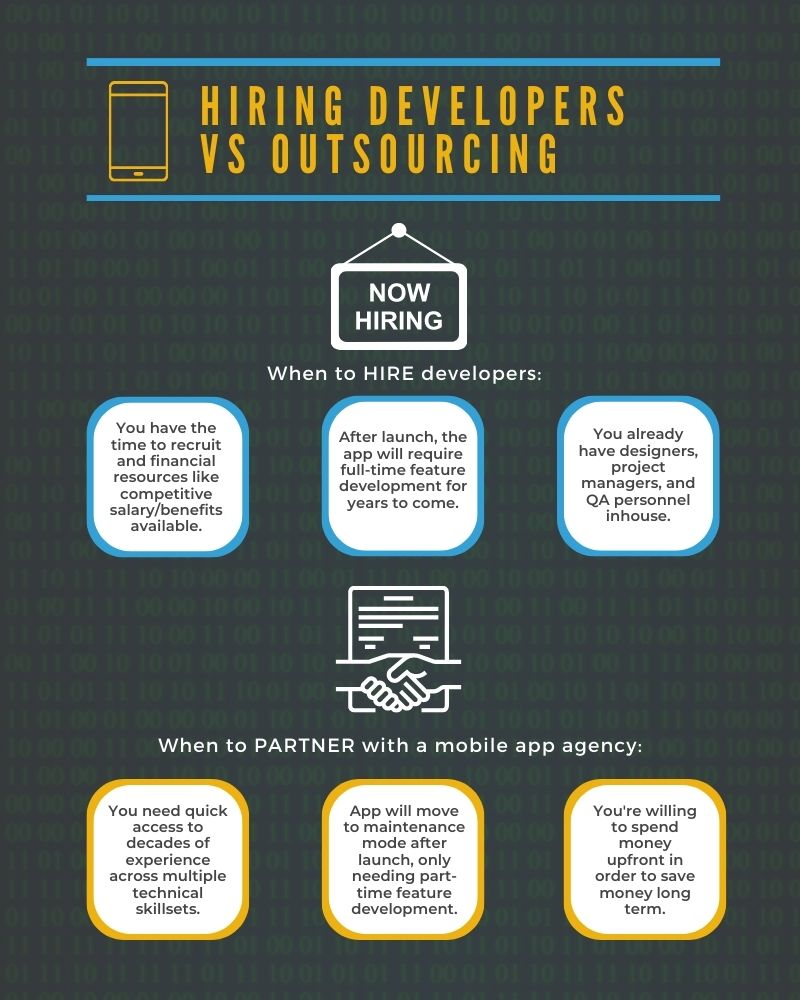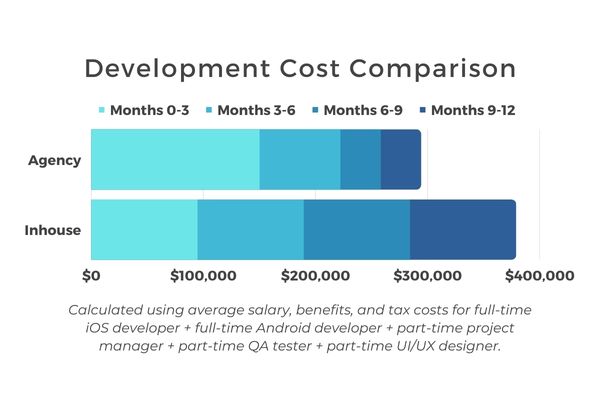
You’ve likely heard all companies are tech companies now, regardless of the product they sell or service they provide.
A company’s technology is no longer simply the copier in the break room, the computers at the desks, and the phone and internet lines running in and out of the building. And if you’re a small to midsize business, you probably didn’t think twice about partnering with a vendor to manage these technical products and services.
So what about the more modern tech that powers your company? The different software each department uses that needs to talk to each other? The mobile app your customers or employees want for a streamlined experience? The web dashboard you need for managing your data?
When does it make sense to hire developers to build and manage your digital tools and integrations and when does it make sense to partner with a digital product agency?
We summed it up in the infographic below, but this is a blog after all, so we’ll dive into a bit more detail.

When to HIRE developers
You aren’t in a hurry to start your project.
Software developers are in high demand, considering nearly every industry needs them. Glassdoor conducted a study in 2015 of how long it took to hire various technical positions in the United States, with results indicating time-to-hire was anywhere from 12 to 35 days, depending on the technical role.
You can download the full report here.
The need for developers has only grown since 2015, so it’s safe to assume it could be at least a month before you hire someone and your project kicks off.
You have an HR department/recruiter and a recruitment budget.
Consider these stats. Technical recruiting is…
Time-consuming
We mentioned Glassdoor’s time-to-hire results above. Here’s a similar one.
Dice did a study of the 15 Hardest-to-Fill Tech Jobs in the Nation’s Big Tech Hubs and found that the hardest-to-fill job was software developer/engineer, taking up to 39 days.
Expensive
CodeSubmit created a definitive guide on The Cost of Hiring a Software Developer in 2022 and found it costs employers anywhere from $28,548 to $35,685 to hire a full-time developer.
When indirect costs like productivity losses are also taken into account, the sum could rise to $41,049.
Competitive (and not guaranteed)
The US Bureau of Labor Statistics projects the employment of software developers to grow by 22% from 2019 to 2029, much faster than the average for any other occupation.
But there just isn’t enough talent to support the growing demand.
Forbes published an article on the developer shortage, and reported that as of December 2020, 40 million technical jobs went unfulfilled due to a lack of talent, and that The US Labor Department estimates this number could reach 85.2 million by 2030.
You have a CTO or technical individual with management experience.
Depending on the level of experience your developer has, you probably shouldn’t rely on them to be the sole technical expert on the project.
You might think you want to hear “Yes” every time you ask your developers if something can be done, but that’s one of the worst things for your project. Read why here.
What you really want to hear is, “Here’s the implications from that idea. And here’s a better solution.”
But pushing back against the loudest voice in the room when the project inevitably runs into scope creep or any other issue can be intimidating for a developer. So if no one else on your team has a technical background, you’ll want to look for a senior-level developer with experience not only developing but also managing the technical scope of a project.
You can offer a competitive salary and benefits.
Developers have a lot of job options to choose from in this employee market. Competitive (if not higher) salary and benefits will be needed in order for your role to stand out. More on this later.
Your software/app will need years of heavy feature development.
Developers are creative, problem-solving individuals who like to do exactly what their job title suggests: develop.
Unless you have a lengthy roadmap of feature development, your app or software will likely move to more of a support/maintenance type role after its key features are launched. If you do hire internal developers to build your app, they’re likely to jump ship at this point.
Why? There’s no profound answer here other than maintenance is boring compared to new projects.
You can find an entire thread on StackExchange about why developers are averse to maintenance.
You already have other key team members in place.
It takes a village to build custom mobile software. Outside of mobile, web, and server developers, you’ll need a UI/UX designer, a project manager, and quality assurance testers at the very least.
When to PARTNER with a digital product development agency.
You’re ready to roll.
Because digital product teams work on development projects day in and day out, they have repeatable processes in place for getting going on a project, and there’s no recruitment downtime.
Developers are assigned to your project. Sprints and goals are established. Communication routines are scheduled. And you’re off!
You need access to multiple tech skills.
Mobile apps and web apps rarely stand alone. They often integrate and communicate with other parts of your business.
Maybe you have customers using an iOS app that interacts with a bluetooth device, and you need usage reports visible on a website that also syncs with Salesforce. There’s 4 tech specialties in that sentence alone:
iOS <> Bluetooth
iOS <> Server
Website <> Server
Server <> Salesforce
Your digital tool will only need occasional feature development after launch.
This one and the next one pretty much go hand in hand, but since it’s the biggest indicator of the development approach you should take, we’re okay mentioning it twice.
If the bulk of your features will be built in the initial stage of development, working with a digital product agency will (1) save you from having to terminate a full-time position as the app requires less attention, (2) save you from having to recruit a new team member when your developer puts in their notice (see above about software developers not liking maintenance) and (3) save you money long term.
Speaking of money…
You want long term savings.
The bulk of spend with a digital product agency is in the first three months, during the heavy development phase.
Once mobile software launches, it generally falls into a phase of lighter feature development before moving on to routine maintenance and bug fixes.
During these post-launch phases, monthly spend with a digital product team lessens as your app requires less attention. But monthly spend with an inhouse team of developers never changes, no matter what cycle of development or support your software is in or how much attention it does or doesn’t need.
For mobile software with heavy feature development mostly in the beginning, here’s a visual for what the first year of spend could look like with a digital product agency compared to an inhouse team.

If hiring your own team seems like the right path for developing your mobile software, we recommend checking out places like Black Tech Talent, The Invisible Network, and Tech.MN, to name a few within our network!
Or if it makes more sense to work with a digital product agency to develop your app, website, or software, we recommend interviewing at least two potential partners. Download our guide for 22 Questions to Ask a Development Team to help you find the right digital product team for your project.
 Jenny Karkowski
Jenny Karkowski

